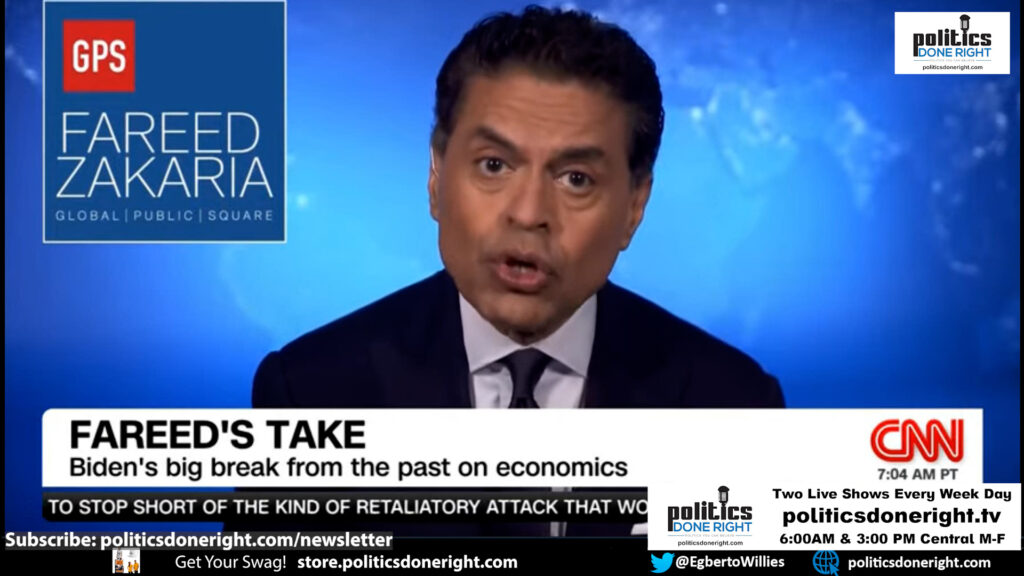In a path towards real journalism seldom practiced by the mainstream media, Fareed Zakaria nearly perfectly defined the transformative Biden/Harris administration in economics, poverty, & infrastructure. Kamala Harris must summarize it and pivot to the future.
Fareed Zakaria, go it. Kamala Harris can nail it.
Podcasts (Video — Audio)
In a recent commentary, Fareed Zakaria provided an astute analysis of President Joe Biden‘s presidency, highlighting the significant economic and infrastructural accomplishments largely overshadowed by political rhetoric and misinformation. This analysis comes at a crucial time as Kamala Harris gears up for a potential presidential run against Donald Trump, facing a barrage of criticisms about the economy and the overall state of the Biden administration. Zakaria’s insights provide a compelling counter-narrative that Harris can leverage to set the record straight and pivot towards a brighter future for America.
Zakaria’s piece is notable for clearly depicting Biden’s transformative economic policies. Over the past several decades, federal investments in the American economy have been minimal, with the focus largely on tax cuts that disproportionately benefit the wealthy. Presidents Reagan, Bush, and Trump implemented significant tax reductions that led to private wealth accumulation amidst public infrastructure decay. This has manifested in stark contrasts: opulent private residences juxtaposed with crumbling public roads and alarmingly high child mortality rates compared to other industrialized nations.
Biden’s administration, however, has broken this trend. He has utilized federal resources to invest heavily in infrastructure, childcare, manufacturing, and energy. Over 56,000 transportation projects are underway, marking the largest upgrade since the 1950s. The manufacturing sector is experiencing a revival, reversing a longstanding decline, while green energy initiatives are booming. Perhaps most notably, Biden’s expanded child tax credit, although short-lived due to Republican opposition, reduced child poverty by 46%, lifting 3.4 million children out of poverty in just one year.
Despite these achievements, Biden’s presidency is frequently overshadowed by persistent criticisms, particularly concerning inflation. Zakaria points out that while Biden’s policies did contribute to inflation, the context is critical. The influx of cash into the economy, which is partly to blame for inflation, also spurred unprecedented job creation and economic recovery. The United States has created over 15 million jobs during Biden’s tenure, maintaining an unemployment rate under 4% for over two years—the most prolonged period since the 1960s. This economic resurgence has been particularly beneficial for Black Americans, with their labor force participation rates surpassing whites for the first time on a sustained basis.
Zakaria partially attributes the inflation issue to Biden, but a more nuanced analysis reveals the situation’s complexity. Corporate decisions, such as price-gouging and strategic supply limitations, played significant roles in driving up prices. For instance, oil prices surged not because of actual shortages but due to deliberate production cuts by oil-producing nations to maintain high prices. This highlights a broader systemic issue within capitalism: profit maximization often precedes consumer welfare.
In addition to economic accomplishments, Biden has made substantial strides in foreign policy. His administration has strengthened alliances in the Indo-Pacific region, fostering cooperation with Japan, South Korea, India, and Australia. These efforts have enhanced America’s global standing, with many countries viewing the United States more favorably than the Trump era. Furthermore, Biden’s presidency has reinstated a sense of sanity, decency, and dignity to the office, moving away from the dangerous demagoguery and anti-democratic rhetoric that characterized his predecessor.
However, for Biden’s legacy to endure and for Kamala Harris to succeed in the upcoming election, it is imperative to address the ongoing challenges related to immigration and inflation. The current immigration crisis, with roots tracing back to policies from previous administrations, including those of Clinton and Bush, has been exacerbated by economic agreements like NAFTA. While beneficial for corporate America, these agreements have often disadvantaged workers in both the U.S. and Latin America, contributing to increased migration pressures.
Harris must articulate a clear vision, acknowledge these complexities, and present viable solutions. She should emphasize the positive impacts of Biden’s economic policies, countering the false narratives that Trump and his surrogates propagated. Moreover, addressing the root causes of inflation and advocating for fair corporate practices will resonate with voters who feel the pinch of rising prices.
Fareed Zakaria’s insightful analysis offers a powerful narrative that Kamala Harris can use to her advantage. By highlighting the tangible benefits of Biden’s policies and addressing the systemic issues contributing to current challenges, Harris can effectively counter the criticisms and present a progressive vision for America’s future. This approach sets the record straight and paves the way for continued progress and prosperity.
Viewers are encouraged to subscribe and join the conversation for more insightful commentary and to support progressive messages. Together, we can populate the internet with progressive messages that represent the true aspirations of most Americans.

